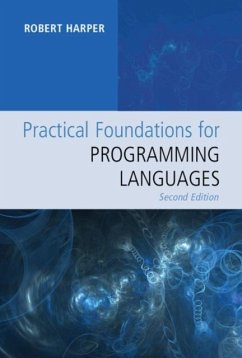This text develops a comprehensive theory of programming languages based on type systems and structural operational semantics. Language concepts are precisely defined by their static and dynamic semantics, presenting the essential tools both intuitively and rigorously while relying on only elementary mathematics. These tools are used to analyze and prove properties of languages and provide the framework for combining and comparing language features. The broad range of concepts includes fundamental data types such as sums and products, polymorphic and abstract types, dynamic typing, dynamic dispatch, subtyping and refinement types, symbols and dynamic classification, parallelism and cost semantics, and concurrency and distribution. The methods are directly applicable to language implementation, to the development of logics for reasoning about programs, and to the formal verification language properties such as type safety. This thoroughly revised second edition includes exercises at the end of nearly every chapter and a new chapter on type refinements.
Dieser Download kann aus rechtlichen Gründen nur mit Rechnungsadresse in A, B, BG, CY, CZ, D, DK, EW, E, FIN, F, GR, HR, H, IRL, I, LT, L, LR, M, NL, PL, P, R, S, SLO, SK ausgeliefert werden.
Review of previous edition: 'Harper's book provides a comprehensive treatment of the foundations of computation. He touches on a surprising range of concepts that arise in language design: from simple types to polymorphism to dependent types to modules; from strict to lazy to parallel computation; and from proof techniques for reasoning about extensional behavior to practical, compositional cost models in the presence of garbage collection. More importantly, throughout the book he uses types and the principles of type theory to organize the material and help us discover the orthogonal, composable abstractions that arise naturally not only in the design of programming languages but also in logics and mathematics. This approach helps uncover the fundamental structure lurking inside programming languages of today, and provides a principled approach to the designs for tomorrow.' Greg Morrisett, Cornell University, New York

